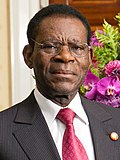Equatorial Guinean presidential election, 2016
|
|
|||||||||||||||||
|---|---|---|---|---|---|---|---|---|---|---|---|---|---|---|---|---|---|
|
|||||||||||||||||
| Registered | 325,548 | ||||||||||||||||
| Turnout | 92.70% | ||||||||||||||||
|
|||||||||||||||||

Presidential election results map. Green denotes districts won by Teodoro Obiang Nguema Mbasogo.
|
|||||||||||||||||
|
|||||||||||||||||
Teodoro Obiang Nguema Mbasogo
PDGE
Teodoro Obiang Nguema Mbasogo
PDGE
Presidential elections were held in Equatorial Guinea on 24 April 2016. In a vote initially scheduled for November but brought forward by seven months, incumbent President Teodoro Obiang Nguema Mbasogo retained his office with 93.7 percent of the vote.
The president is elected using the first-past-the-post system. After the 2011 constitutional referendum, presidents were limited to two terms of seven years and the age limit for candidates was removed. In addition, the post of Vice President was established, allowing the vice president to automatically assume power if the president died in office.
The leading candidate was incumbent president Teodoro Obiang Nguema Mbasogo, running for his first term after the 2011 constitutional referendum. He ran as the candidate of the Democratic Party of Equatorial Guinea, a coalition of ten parties, and was expected to win. At the time of the election, Obiang was the longest serving African president, having been in power since 1979. He was widely expected to win the vote.
The opposition were all mainly new faces with little political recognition and none of their parties were represented in Parliament. There were also three independent candidates, which critics claimed were dummy candidates to provide legitimacy for the elections. The Democratic Opposition Front, which is a coalition of dissident parties, boycotted the election, citing that the election would be "anti-constitutional" and that Obiang would win "with a big score as a result of fraud". Opposition candidate, Gabriel Nse Obiang Obono, was prevented from running for not meeting residency requirements.
...
Wikipedia

